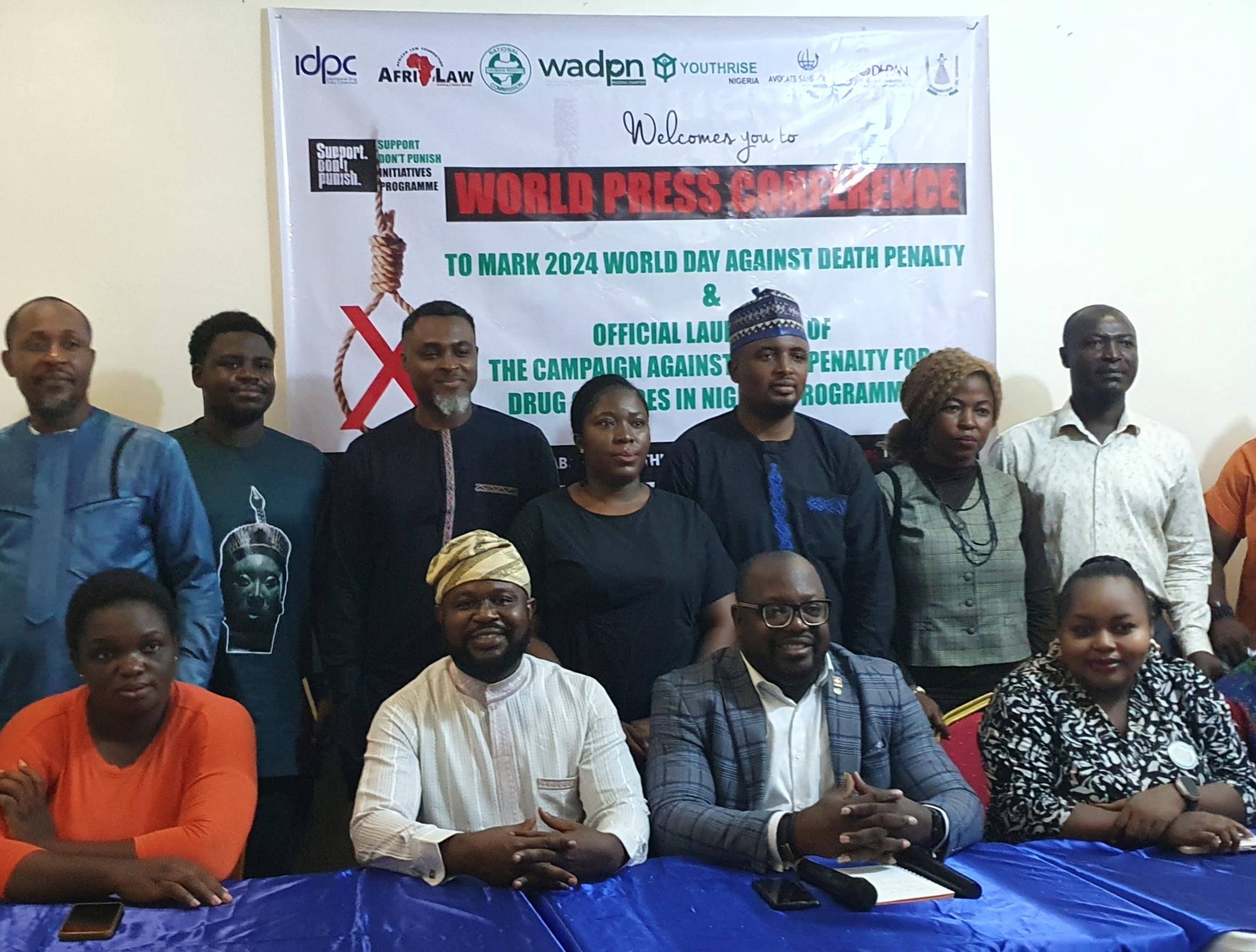Princess Onyedinefu
Several Civil Society Organisations (CSOs) have called on the federal and state governments to repeal the death penalty for drug offences. The groups, including the African Law Foundation (AFRILAW), West African Drug Policy Network (WADPN) Nigeria, Avocats Sans Frontières (ASF) France/Lawyers Without Borders, YouthRISE Nigeria, Drug Harm Reduction Advocacy Network (DHRAN), and the International Federation of Women Lawyers (FIDA), made their appeal during a press conference held in Abuja on Thursday.
The event, which also marked the 2024 World Day Against the Death Penalty, saw the official launch of a campaign against the death penalty for drug offences in Nigeria. The coordinator of the campaign and Chief Executive Officer of AFRILAW, Mr Okereke Chinwike, expressed concern over the recent reintroduction of the death penalty for drug-related offences by the Senate in a bill to amend the Nigeria Drug Law Enforcement Agency (NDLEA) Act.
Chinwike criticized the Senate for its “controversial and hurried” decision to reinstate capital punishment for drug offences, replacing life imprisonment as the maximum sentence. He noted that there was no “wide public and stakeholders consultation or hearing” before the decision was made, contrary to claims by the Senate Joint Committee on Judiciary, Human Rights, and Legal Matters, as well as the Committee on Drugs and Narcotics.
He stressed that many CSOs, particularly those focused on drug policy, health, human rights, and justice, were not allowed to participate in the legislative process.
Chinwike called on President Bola Ahmed Tinubu to withhold assent to the bill unless the death penalty provision for drug offences is removed. He urged the National Assembly to abolish the death penalty for all crimes and advocated for the commutation of all death sentences to terms of imprisonment. Furthermore, Chinwike called for the establishment of an official moratorium on executions in Nigeria.
“We fully acknowledge the negative impacts of drug-related crimes in Nigerian society and recognize the government’s duty to protect its citizens. However, that duty should not involve taking human lives,” Chinwike stated.
He argued that the death penalty has not proven to be an effective deterrent against crime, citing evidence from both Nigeria and other countries. He pointed out the reluctance of state governors to sign death warrants and the lack of transparency surrounding capital punishment for drug offences. He further highlighted the increasing budget required for prolonged detentions and prison operations, often tied to the misapplication of justice or vindictive legal practices.
“There is no credible evidence that the death penalty is more effective than prison terms in deterring crime,” he continued. “We believe that those found guilty of drug crimes should be held accountable through fair trials that meet international standards—but without recourse to the death penalty.”
Chinwike emphasized that Nigeria’s drug policies should focus on improving public health, safety, and socioeconomic well-being by reducing drug use, illicit trafficking, and associated crimes. He warned that, in light of the country’s current economic challenges, imposing the death penalty would lead to unnecessary expenditure.
“We call on the federal government to ensure that the criminal justice system for drug law enforcement is adequately resourced, capable of effectively investigating crimes, supporting victims, and providing fair trials for drug offenders—without resorting to the death penalty,” he concluded.
The press conference ended with a unified call for the abolition of capital punishment, with the CSOs urging both the government and the public to focus on more humane, effective measures in drug law enforcement.
Here is the full press statement:
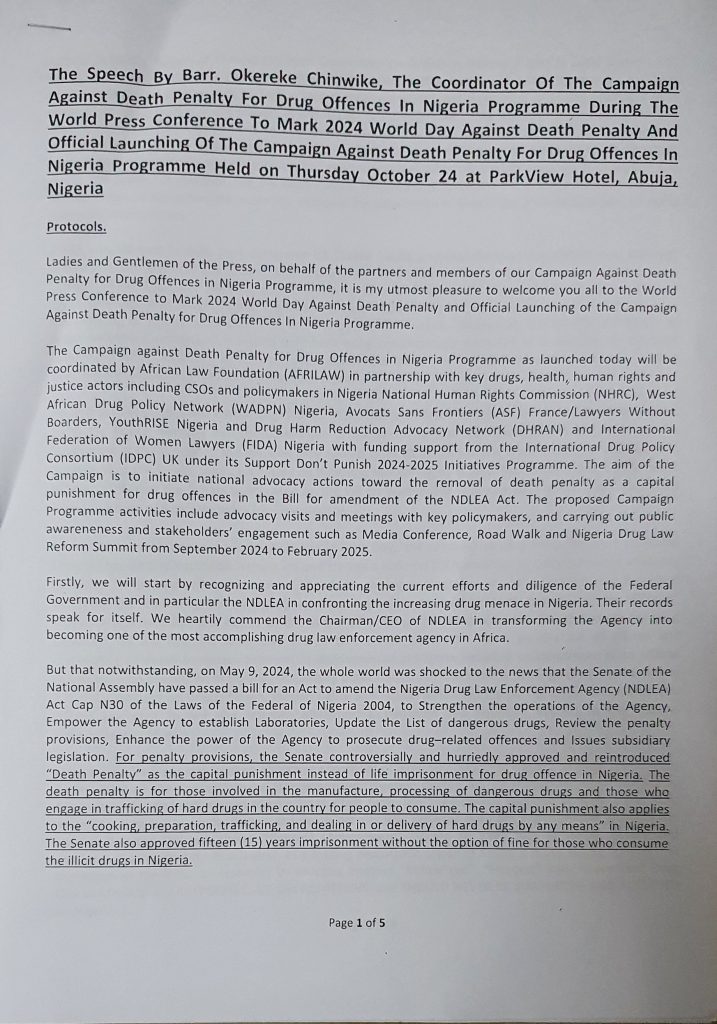
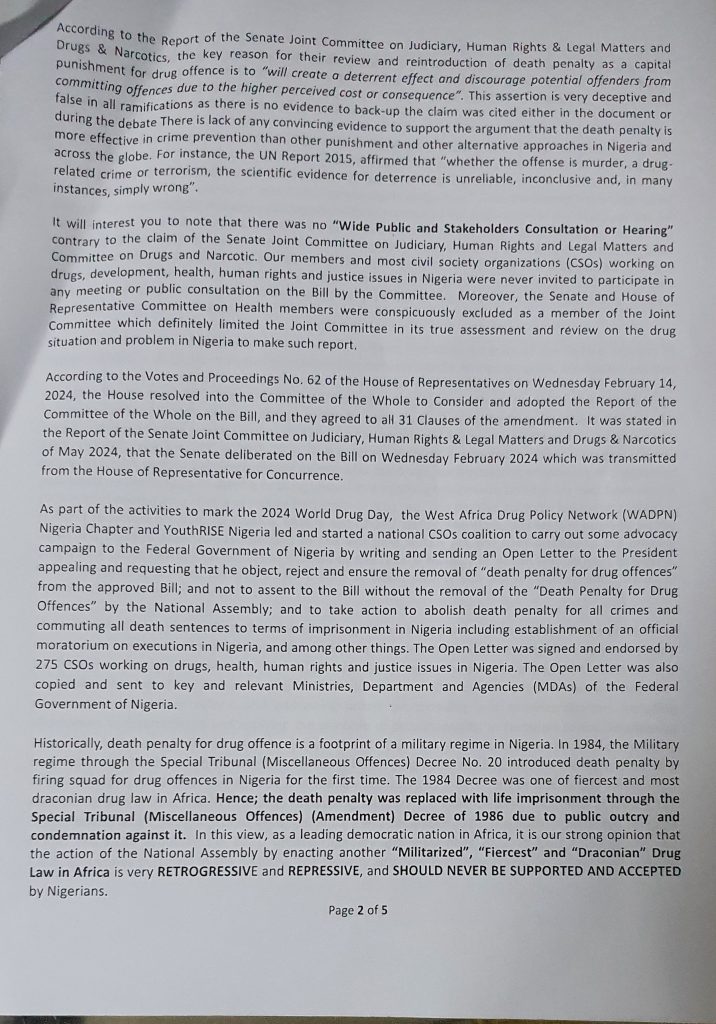
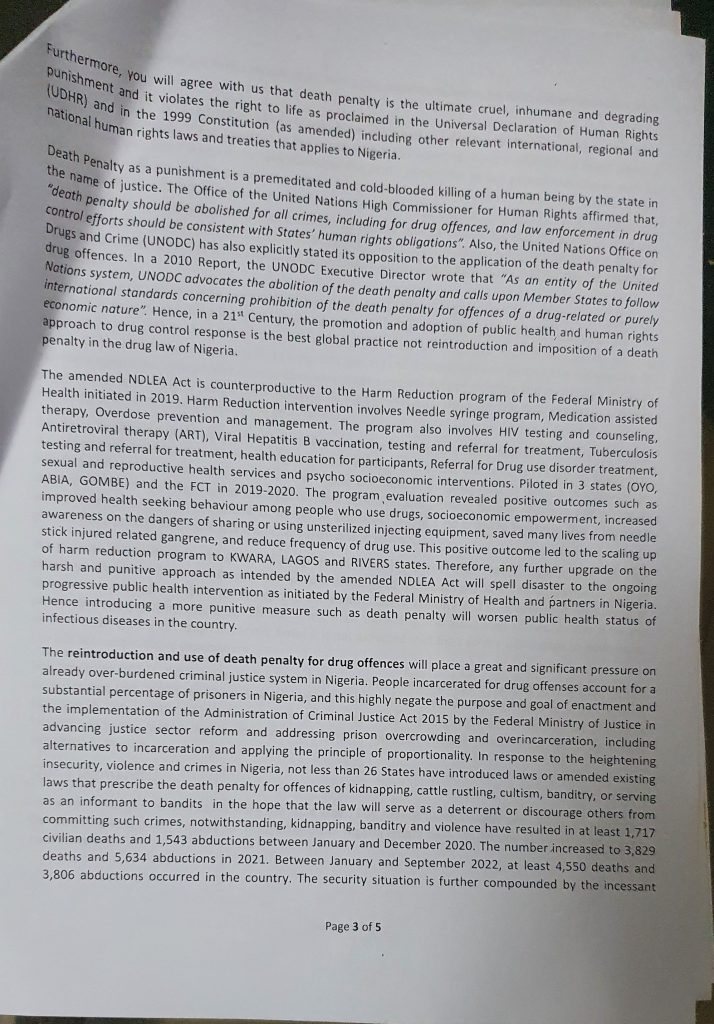
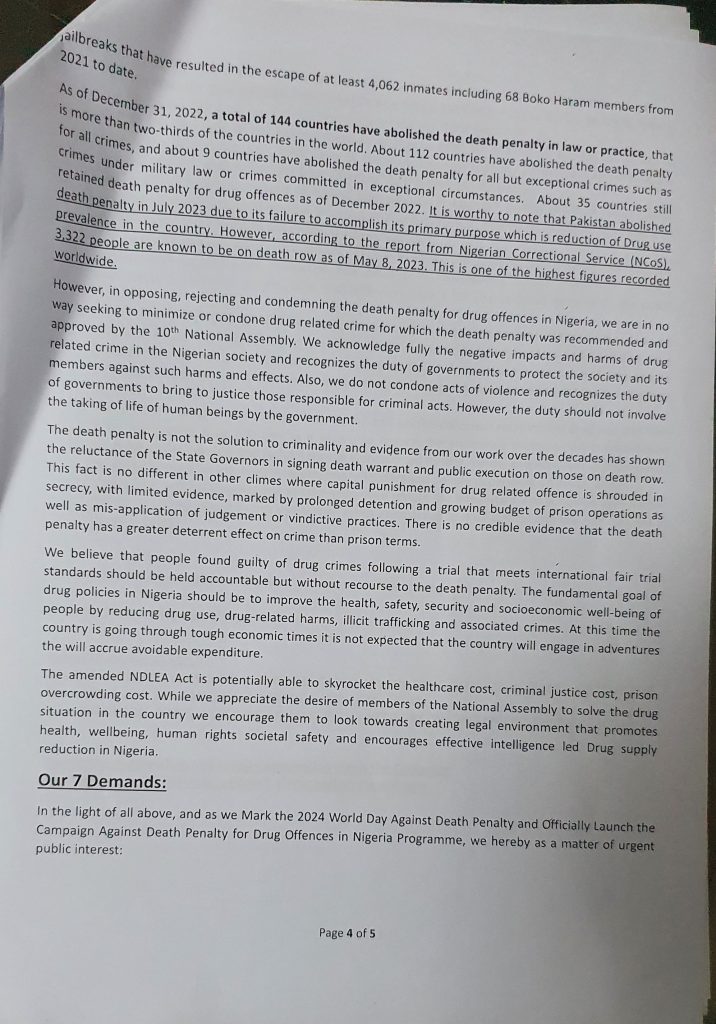
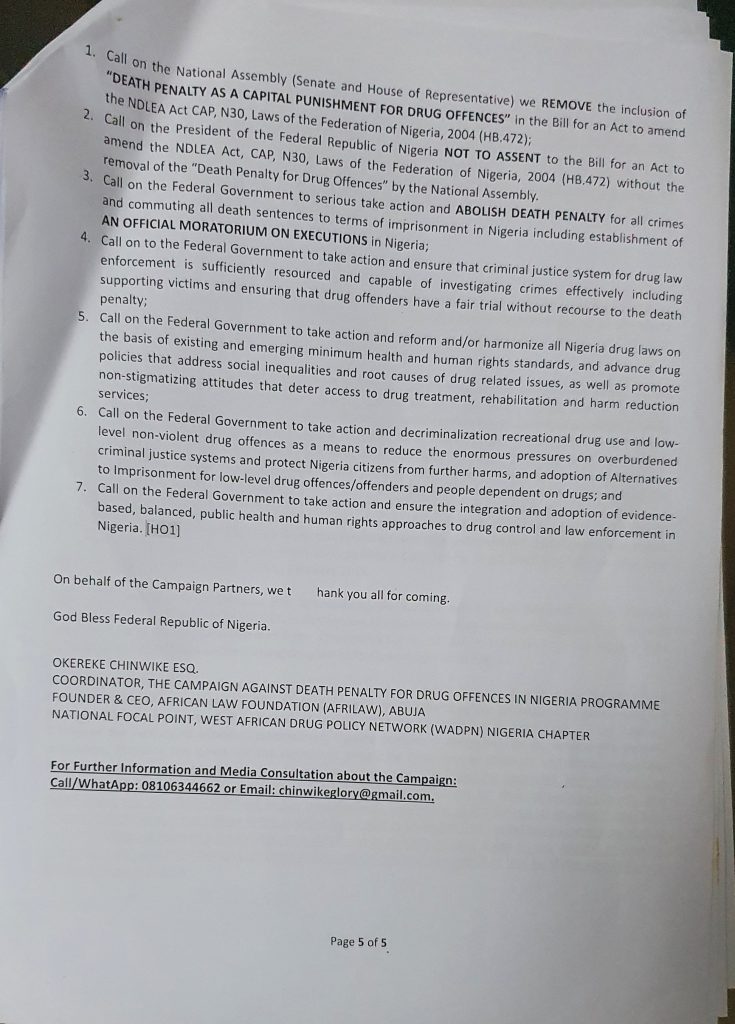
The Speech By Barr. Okereke Chinwike, The Coordinator Of The Campaign Against Death Penalty For Drug Offences In Nigeria Programme During The World Press Conference To Mark 2024 World Day Against Death Penalty And Official Launching Of The Campaign Against Death Penalty For Drug Offences In Nigeria Programme Held on Thursday, October 24 at Parkview Hotel, Abuja, Nigeria
Protocols.
Ladies and Gentlemen of the Press, on behalf of the partners and members of our Campaign Against Death Penalty for Drug Offences in Nigeria Programme, it is my utmost pleasure to welcome you all to the World Press Conference to Mark 2024 World Day Against Death Penalty and Official Launching of the Campaign Against Death Penalty for Drug Offences In Nigeria Programme.
The Campaign against Death Penalty for Drug Offences in Nigeria Programme as launched today will be coordinated by African Law Foundation (AFRILAW) in partnership with key drugs, health, human rights and justice actors including CSOs and policymakers in Nigeria’s National Human Rights Commission (NHRC), West African Drug Policy Network (WADPN) Nigeria, Avocats Sans Frontiers (ASF) France/Lawyers Without Borders, Youth RISE Nigeria and Drug Harm Reduction Advocacy Network (DHRAN) and International Federation of Women Lawyers (FIDA) Nigeria with funding support from the International Drug Policy Consortium (IDPC) UK under its Support Don’t Punish 2024-2025 Initiatives Programme. The Campaign aims to initiate national advocacy actions toward the removal of the death penalty as capital punishment for drug offences in the Bill for amendment of the NDLEA Act. The proposed Campaign Programme activities include advocacy visits and meetings with key policymakers and carrying out public awareness and stakeholders such as Media Conference, Road Walks and the Nithe Nigeria Drug Law Reform Summit from September 2024 to February 2025.
Firstly, we will start by recognizing and appreciating the current efforts and diligence of the Federal Government and, in particular, the NDLEA in confronting the increasing drug menace in Nigeria. Their records speak for itself. We heartily commend the Chairman/CEO of NDLEA for transforming the Agency into one of the most accomplished drug law enforcement agencies in Africa.
But that notwithstanding, on May 9, 2024, the whole world was shocked by the news that the Senate of the National Assembly had passed a bill for an Act to amend the Nigeria Drug Law Enforcement Agency (NDLEA) Act Cap N30 of the Laws of the Federal of Nigeria 2004, to Strengthen the operations of the Agency,
Empower the Agency to establish Laboratories, Update the List of dangerous drugs, Review the penalty provisions, Enhance the power of the Agency to prosecute drug-related offences and Issue subsidiary legislation. For penalty provisions, the Senate controversially and hurriedly approved and reintroduced the death Penalty” as capital punishment instead of life imprisonment for drug offences in Nigeria. The death penalty is for those involved in the manufacture and processing of dangerous drugs and those who engage in the trafficking of hard drugs in the country for people to consume. Capital punishment also applies to the “cooking, preparation, trafficking, and dealing in or delivery of hard drugs by any means” in Nigeria.
The Senate also approved fifteen (15) years imprisonment without the option of fine for those who consume illicit drugs in Nigeria.
According to the Report of the Senate Joint Committee on Judiciary, Human Rights & Legal Matters and Drugs & Narcotics, the key reason for their review and reintroduction of the death penalty as a capital punishment for drug offence is to “create a deterrent effect and discourage potential offenders from committing offences due to the higher perceived cost or consequence”. This assertion is very deceptive and false in all ramifications as there is no evidence to back up the claim was cited either in the document or during the debate There is a lack of any convincing evidence to support the argument that the death penalty is more effective in crime prevention than other punishment and other alternative approaches in Nigeria and across the globe. For instance, the UN Report 2015 affirmed that “whether the offence is murder, a drug-related crime or terrorism, the scientific evidence for deterrence is unreliable, inconclusive and, in many instances, simply wrong”.
It will interest you to note that there was no “Wide Public and Stakeholders Consultation or Hearing” contrary to the claim of the Senate Joint Committee on Judiciary, Human Rights and Legal Matters and Committee on Drugs and Narcotics. Our members and most civil society organizations (CSOs) working on drugs, development, health, human rights and justice issues in Nigeria were never invited to participate in any meeting or public consultation on the Bill by the Committee. Moreover, the Senate and House of Representative Committee on Health members were conspicuously excluded as a member of the Joint Committee, which Joint Committee in its true assessment and review of the drug situation and problem in Nigeria to make such a report.
According to the Votes and Proceedings No. 62 of the House of Representatives on Wednesday, February 1,4, 2024, the House resolved into the Committee of the Whole to Consider and adopt the adoption of the Committee of the Whole on the Bill, and they agreed to all 31 Clauses of the amendment. It was stated in the Report of the Senate Joint Committee on Judiciary, Human Rights & Legal Matters and Drugs & Narcotics of May 2024 that the Senate deliberated on the Bill on Wednesday, February 2024, which was transmitted from the House of Representatives for Concurrence.
As part of the activities to mark the 2024 World Drug Day, the West Africa Drug Policy Network (WADPN) Nigeria Chapter and Youth RISE Nigeria led and started a national CSO coalition to carry out some advocacy campaigns to the Federal Government of Nigeria by writing and sending an Open Letter to the President appealing and requesting that he object, reject and ensure the removal of “death penalty for drug offences” from the approved Bill; and not to assent to the Bill without the removal of the “Death Penalty for Drug Offences” by the National Assembly; and to take action to abolish death penalty for all crimes and commuting all death sentences to terms of imprisonment in Nigeria including establishment of an official moratorium on executions in Nigeria, and among other things. The Open Letter was signed and endorsed by 275 CSOs working on drugs, health, human rights and justice issues in Nigeria. The Open Letter was also copied and sent to key and relevant Ministries, Department and Agencies (MDAs) of the Federal Government of Nigeria.
Historically, the death penalty for drug offences is a footprint of a military regime in Nigeria. In 1984, the Military regime, through the Special Tribunal (Miscellaneous Offences) Decree No. 20, introduced the death penalty by firing squad for drug offences in Nigeria for the first time. The 1984 Decree was one of the fiercest and most draconian drug laws in Africa. Hence; the death penalty was replaced with life imprisonment through the Special Tribunal (Miscellaneous Offences) (Amendment) Decree of 1986 due to public outcry and condemnation against it. In this view, as a leading democratic nation in Africa, it is our strong opinion that the action of the National Assembly by enacting another “Militarized”, “Fiercest”, and “Draconian” Drug Law in Africa is very RETROGRESSIVE and REPRESSIVE and SHOULD NEVER BE SUPPORTED AND ACCEPTED by Nigerians.
Furthermore, you will agree with us that the death penalty is the ultimate cruel, inhumane and degrading punishment and it violates the right to life as proclaimed in the Universal Declaration of Human Rights (UDHR) and the 1999 Constitution (as amended) including other relevant international, regional and national human rights laws and treaties that applies to Nigeria.
Death Penalty as a punishment is a premeditated and cold-blooded killing of a human being by the state in the name of justice. The Office of the United Nations High Commissioner for Human Rights affirmed that the “death penalty should be abolished for all crimes, including for drug offences, and law enforcement in drug control efforts should be consistent with States’ human rights obligations”. Also, the United Nations Office on Drugs and Crime (UNODC) has explicitly stated its opposition to the application of the death penalty for drug offences. In a 2010 Report, the UNODC Executive Director wrote that “As an entity of the United Nations system, UNODC advocates the abolition of the death penalty and calls upon Member States to follow international standards concerning the prohibition of the death penalty for offences of a drug-related or purely economic nature”. Hence, in the 21st Century, the promotion and adoption of public health and human rights approaches to drug control response is the best global practice, not the reintroduction and imposition of the death penalty in the drug law of Nigeria.
The amended NDLEA Act is counterproductive to the Harm Reduction program of the Federal Ministry of Health initiated in 2019. Harm Reduction intervention involves a Needle syringe program, Medication-assisted therapy, and Overdose prevention and management. The program also involves HIV testing and counselling, Antiretroviral therapy (ART), Viral Hepatitis B vaccination, testing and referral for treatment, Tuberculosis testing and referral for treatment, health education for participants, Referral for Drug use disorder treatment, sexual and reproductive health services and psycho socioeconomic interventions. Piloted in 3 states (OYO, ABIA, GOMBE) and the FCT in 2019-2020. The program evaluation revealed positive outcomes such as improved health-seeking behaviour among people who use drugs, socioeconomic empowerment, increased awareness of the dangers of sharing or using unsterilized injecting equipment, saving many lives from needle stick injuries related to gangrene, and reduced frequency of drug use. This positive outcome led to the scaling up of the harm reduction program to KWARA, LAGOS and RIVERS states. Therefore, any further upgrade on the harsh and punitive approach as intended by the amended NDLEA Act will spell disaster to the ongoing progressive public health intervention as initiated by the Federal Ministry of Health and partners in Nigeria.
Hence, introducing a more punitive measure, such as the death penalty, will worsen the public health status of infectious diseases in the country.
The reintroduction and use of the death penalty for drug offences will place significant pressure on the already over-burdened criminal justice system in Nigeria. People incarcerated for drug offences account for a substantial percentage of prisoners in Nigeria, and this highly negates the purpose and goal of enactment and the implementation of the Administration of Criminal Justice Act 2015 by the Federal Ministry of Justice in advancing justice sector reform and addressing prison overcrowding and over-incarceration, including alternatives to incarceration and applying the principle of proportionality. In response to the heightening insecurity, violence and crimes in Nigeria, not less than 26 States have introduced laws or amended existing laws that prescribe the death penalty for offences of kidnapping, cattle rustling, cultism, banditry, or serving as an informant to bandits in the hope that the law will serve as a deterrent or discourage others from committing such crimes, notwithstanding, kidnapping, banditry and violence have resulted in at least 1,717 civilian deaths and 1,543 abductions between January and December 2020. The number increased to 3,829 deaths and 5,634 abductions in 2021. Between January and September 2022, at least 4,550 deaths and 3,806 abductions occurred in the country. The security situation is further compounded by the incessant jailbreaks that have resulted in the escape of at least 4,062 inmates, including 68 Boko Haram members, from 2021 to date.
As of December 31, 2022, a total of 144 countries have abolished the death penalty in law or practice, that is more than two-thirds of the countries in the world. About 112 countries have abolished the death penalty for all crimes, and about 9 countries have abolished the death penalty for all but exceptional crimes such as crimes under military law or crimes committed in exceptional circumstances. About 35 countries still retained the death penalty for drug offences as of December 2022. It is worth noting that Pakistan abolished the death penalty in July 2023 due to its failure to accomplish its primary purpose, which is the reduction of Drug use prevalence in the country.
However, according to the report from the Nigerian Correctional Service (NCOS), 3,322 people are known to be on death row as of May 8, 2023. This is one of the highest figures recorded worldwide.However, in opposing, rejecting and condemning the death penalty for drug offences in Nigeria, we are in no way seeking to minimize or condone drug-related crime for which the death penalty was recommended and approved by the 10th National Assembly. We acknowledge fully the negative impacts and harms of drug-related crime in Nigerian society and recognize the duty of governments to protect society and its members against such harms and effects. Also, we do not condone acts of violence and recognize the duty of governments to bring to justice those responsible for criminal acts. However, the duty should not involve the taking of life of human beings by the government.
The death penalty is not the solution to criminality, and evidence from our work over the decades has shown the reluctance of State Governors to sign death warrants and public execution of those on death row.
This fact is no different in other climes where capital punishment for drug-related offences is shrouded in secrecy, with limited evidence, marked by prolonged detention and growing budget of prison operations as well as misapplication of judgment or vindictive practices. There is no credible evidence that the death penalty has a greater deterrent effect on crime than prison terms.
We believe that people found guilty of drug crimes following a trial that meets international fair trial standards should be held accountable but without recourse to the death penalty. The fundamental goal of drug policies in Nigeria should be to improve the health, safety, security and socioeconomic well-being of people by reducing drug use, drug-related harms, illicit trafficking and associated crimes. At this time, the country is going through tough economic times, and it is not expected that the country will engage in adventures that will accrue avoidable expenditure.
The amended NDLEA Act is potentially able to skyrocket healthcare costs, criminal justice costs, and prison overcrowding costs. While we appreciate the desire of members of the National Assembly to solve the drug situation in the country, we encourage them to look towards creating a legal environment that promotes health, well-being, human rights, and societal safety and encourages effective intelligence-led Drug supply. Reduction in Nigeria.
Our 7 Demands:
In light of all the above, and as we Mark the 2024 World Day Against Death Penalty and Officially Launch the Campaign Against Death Penalty for Drug Offences in Nigeria Programme, we hereby as a matter of urgent public interest:
1. Call on the National Assembly (Senate and House of Representatives) we REMOVE the inclusion of “DEATH PENALTY AS A CAPITAL PUNISHMENT FOR DRUG OFFENCES” in the Bill for an Act to amend the NDLEA Act CAP, N30, Laws of the Federation of Nigeria, 2004 (HB.472);
2. Call on the President of the Federal Republic of Nigeria NOT TO ASSENT to the Bill for an Act to amend the NDLEA Act, CAP, N30, Laws of the Federation of Nigeria, 2004 (HB.472) without the removal of the “Death Penalty for Drug Offences” by the National Assembly.
3. Call on the Federal Government to seriously take action and ABOLISH the DEATH PENALTY for all crimes and commute all death sentences to terms of imprisonment in Nigeria including the establishment of AN OFFICIAL MORATORIUM ON EXECUTIONS in Nigeria;
4. Call on the Federal Government to take action and ensure that the criminal justice system for drug law enforcement is sufficiently resourced and capable of investigating crimes effectively including supporting victims and ensuring that drug offenders have a fair trial without recourse to the death penalty;
5. Call on the Federal Government to take action and reform and/or harmonize all Nigeria drug laws based on existing and emerging minimum health and human rights standards, and advance drug policies that address social inequalities and root causes of drug-related issues, as well as promote non-stigmatizing attitudes that deter access to drug treatment, rehabilitation and harm reduction services;
6. Call on the Federal Government to take action and decriminalization recreational drug use and low-level non-violent drug offences as a means to reduce the enormous pressures on overburdened criminal justice systems and protect Nigeria citizens from further harm, and adoption of Alternatives to Imprisonment for low-level drug offences/offenders and people dependent on drugs; and
7. Call on the Federal Government to take action and ensure the integration and adoption of evidence-based, balanced, public health and human rights approaches to drug control and law enforcement in Nigeria.
On behalf of the Campaign Partners, we thank you all for coming.
God Bless the Federal Republic of Nigeria.
OKEREKE CHINWIKE ESQ.
COORDINATOR, THE CAMPAIGN AGAINST THE DEATH PENALTY FOR DRUG OFFENCES IN NIGERIA PROGRAMME
FOUNDER & CEO, AFRICAN LAW FOUNDATION (AFRILAW), ABUJA
NATIONAL FOCAL POINT, WEST AFRICAN DRUG POLICY NETWORK (WADPN) NIGERIA CHAPTER

